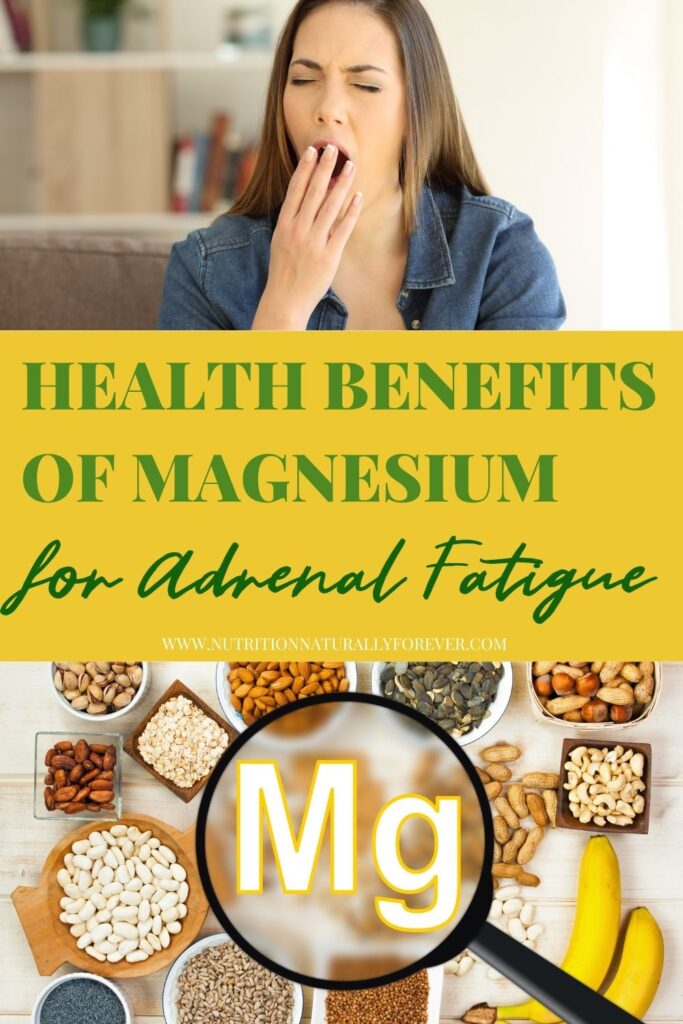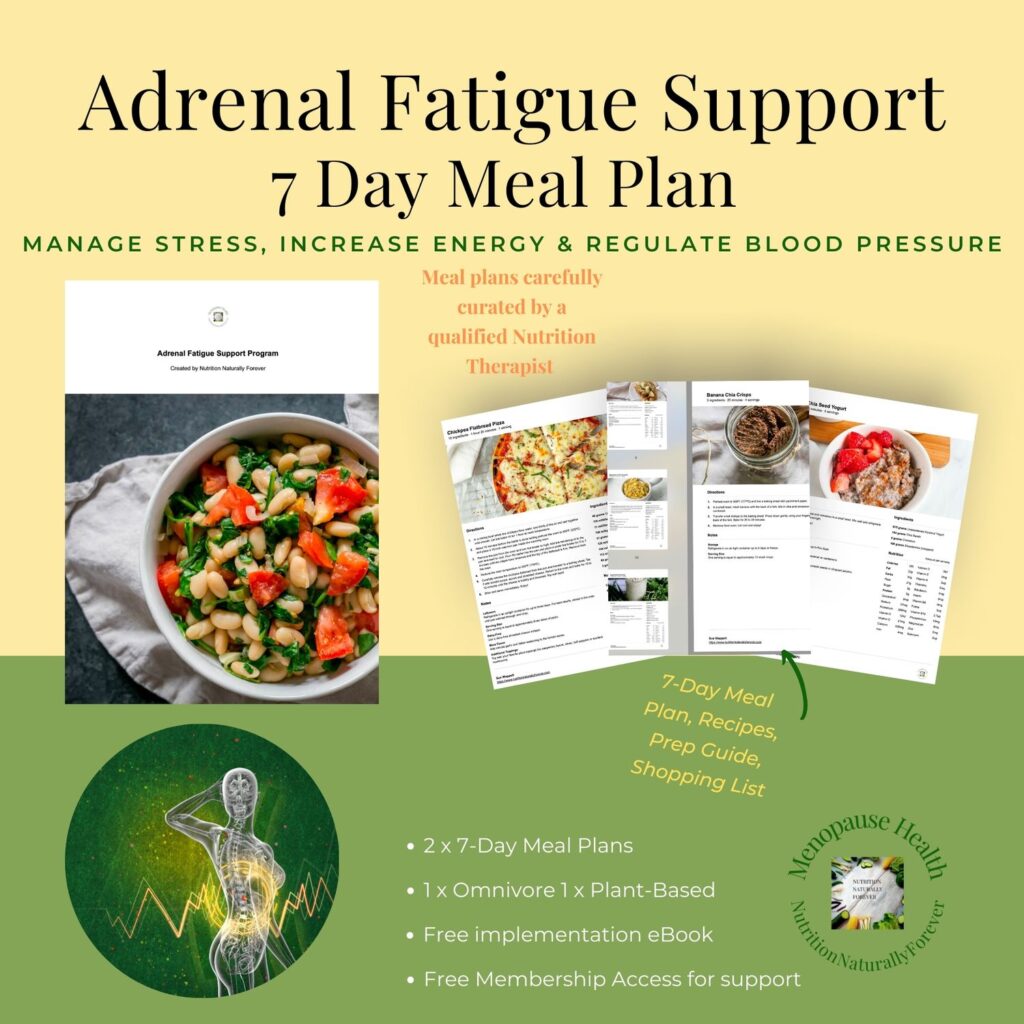
Health Benefits of Magnesium for Adrenal Fatigue.
Adrenal fatigue is a term that’s gained traction in recent years, often used to describe a collection of symptoms ranging from chronic tiredness, which can be diagnosed as chronic fatigue syndrome to hormonal imbalances.
While it’s not yet recognised as a medical diagnosis by conventional medicine, the concept of adrenal fatigue resonates with countless women who find themselves caught in the relentless grip of exhaustion.
Adrenal dysfunction can manifest in the body in several ways including high blood pressure and weight gain as well as symptoms which are commonly associated with menopause.
In this post, discover more about adrenal fatigue and menopause and the benefits of ensuring you get enough magnesium to protect your body through menopause and beyond.
The Role of The Adrenal Glands
The adrenal glands are crucial for hormone production, particularly during times of stress.
Among these hormones, cortisol and adrenaline take centre stage, acting as the body’s primary stress responders.
Cortisol, often referred to as one of the “stress hormones,” plays a multifaceted role in the body, influencing everything from blood sugar levels to immune function.
During times of stress, cortisol levels spike, mobilising your body’s resources to cope with the perceived threat. This can be lifesaving in acute situations, but chronic stress can lead to sustained elevations in cortisol levels, wreaking havoc on your overall health.
Adrenaline (Epinephrine), known as the “fight or flight response” hormone, is released in response to immediate stressors, triggering a surge of energy and heightened alertness to help you respond to perceived threats.
While adrenaline’s effects are short-lived, its impact can be profound, preparing your body to either confront or flee from danger.
During perimenopause, the adrenal glands continue to produce these two main stress hormones as well as DHEA (dehydroepiandrosterone), and small amounts of estrogen and testosterone.
These hormones help to maintain overall hormonal balance during the decline of ovarian hormone production.
Post-menopause, when ovarian estrogen production ceases, the adrenal glands become the primary source of circulating estrogen through the conversion of adrenal androgens (DHEA) into estrogens (estradiol).
This adrenal estrogen production contributes to maintaining the stress response. Hormonal changes associated with menopause can impact adrenal function, potentially leading to symptoms like fatigue, mood swings, and disrupted sleep patterns.
Additionally, adrenal hormones, particularly DHEA and adrenal-derived estrogens, play a role in supporting bone density and may help mitigate the risk of osteoporosis post-menopause.
The adrenal hormones are involved in regulating metabolism.
Maintaining healthy adrenal function post-menopause is essential for overall metabolic health possibly protecting from insulin resistance.
Role of Magnesium in the Body
Magnesium supports adrenal health in several ways.
It helps regulate the body’s stress response by modulating the hypothalamic-pituitary-adrenal (HPA) axis.
It can reduce the release of stress hormones like cortisol, thereby promoting a more balanced stress response.
Magnesium also plays a role in the synthesis and metabolism of hormones, including those produced by the adrenal glands.
Here are some other important roles of magnesium;
- Energy Production: Magnesium is a cofactor in over 300 enzymatic reactions involved in energy metabolism, particularly in the production of ATP (adenosine triphosphate), which is the primary energy currency of cells.
- Muscle Function and Relaxation: Magnesium is vital for muscle contraction and relaxation. It helps regulate calcium levels within cells, which is necessary for proper muscle function and preventing muscle cramps.
- Nervous System Function: Magnesium plays a role in neurotransmitter release and nerve function, influencing mood, stress response, and overall nervous system health.
- Oxidative Stress: Magnesium is involved in the body’s antioxidant systems, helping to reduce oxidative stress that can negatively impact adrenal function during periods of hormonal change like menopause.
- Bone Health: Magnesium is essential for maintaining bone density and strength by regulating calcium absorption and metabolism.
- Heart Health: Magnesium helps maintain electrical impulses and a steady heartbeat and supports vascular tone, contributing to cardiovascular health.
Overall, chronic or prolonged stress can contribute to magnesium depletion in the body by increasing urinary excretion, impairing intestinal absorption, elevating magnesium demand for energy metabolism, disrupting magnesium regulation, and inducing muscle tension.
Symptoms of Magnesium Deficiency
Low magnesium levels, also known as hypomagnesemia, can lead to various symptoms and health issues.
Magnesium deficiency can occur due to inadequate dietary intake, certain medical conditions, or medications that interfere with magnesium absorption or excretion.
These are common symptoms of low magnesium in the body:
- Muscle Cramps and Spasms: Magnesium plays a key role in muscle function and relaxation. Low levels of magnesium can cause muscle cramps, twitches, and spasms, particularly in the legs and feet.
- Fatigue and Weakness: Magnesium is essential for energy production within cells. A deficiency can lead to feelings of fatigue, weakness, and overall low energy levels.
- Mental and Emotional Symptoms: Low magnesium levels may contribute to symptoms such as irritability, anxiety, mood swings, and difficulty concentrating.
- Irregular Heartbeat (Arrhythmia): Magnesium is important for maintaining proper heart rhythm and muscle function. A deficiency can potentially lead to palpitations or irregular heartbeat.
- Numbness and Tingling: Inadequate magnesium levels can cause sensations of numbness, tingling, or pins and needles, especially in the hands and feet.
- Muscle Weakness: Alongside muscle cramps, low magnesium can also cause generalized muscle weakness, making daily activities more challenging.
- Insomnia or Sleep Disturbances: Magnesium helps regulate neurotransmitters involved in sleep. Deficiency may contribute to difficulty falling asleep or disrupted sleep patterns.
- Headaches or Migraines: Some studies suggest a link between low magnesium levels and headaches, including migraines.
- Nausea and Loss of Appetite: Magnesium deficiency can lead to gastrointestinal symptoms such as nausea, vomiting, or loss of appetite.
- Abnormal Heart Function: Severe magnesium deficiency can potentially lead to more serious cardiac complications, such as abnormal heart rhythms or coronary artery spasms.
It’s important to note that these symptoms can vary in severity depending on the extent of magnesium deficiency and individual health factors.
Which Magnesium for Adrenal Fatigue
Magnesium supplements come in different forms, each with unique properties and intended uses. The different types of magnesium supplements can vary in terms of bioavailability (how well they are absorbed by the body) and specific health benefits.
Here are some common types of magnesium and their respective uses:
- Magnesium Citrate:
- Use: Magnesium citrate is commonly used as a laxative to relieve constipation. It has good bioavailability and is also used to support overall magnesium levels.
- Magnesium Glycinate (Magnesium Bisglycinate):
- Use: Magnesium glycinate is well-absorbed and gentle on the stomach. It is often recommended for individuals looking to increase magnesium levels without gastrointestinal side effects. This form is also beneficial for promoting relaxation and supporting muscle function.
- Magnesium Oxide:
- Use: Magnesium oxide has a high magnesium content but lower bioavailability compared to other forms. It is commonly used as a laxative and to relieve occasional constipation.
- Magnesium L-Threonate:
- Use: This form of magnesium has been specifically studied for its potential benefits in supporting cognitive function and brain health. It is thought to penetrate the blood-brain barrier more effectively than other forms of magnesium.
- Magnesium Chloride:
- Use: Magnesium chloride is often used in topical applications (such as magnesium oil or flakes) for transdermal absorption. It can be used to help relax muscles, relieve soreness, and support overall magnesium levels.
- Magnesium Sulfate (Epsom Salt):
- Use: Epsom salt (magnesium sulfate) is commonly used in baths as a way to absorb magnesium through the skin. It can help relax muscles, reduce inflammation, and promote overall relaxation.
- Magnesium Malate:
- Use: Magnesium malate is a compound of magnesium and malic acid. It is often used to support energy production and reduce muscle pain and tenderness, particularly in individuals with conditions like fibromyalgia.
- Magnesium Taurate:
- Use: This form of magnesium is bound to the amino acid taurine. It is sometimes used to support cardiovascular health and heart function due to the potential benefits of taurine.
- Magnesium Orotate:
- Use: Magnesium orotate is a form of magnesium bound to orotic acid. It is sometimes used to support heart health and may have benefits for athletic performance and endurance.
- Magnesium Carbonate:
- Use: Magnesium carbonate is less commonly used compared to other forms. It may be used to provide supplemental magnesium, but it has lower bioavailability compared to some other forms.
When choosing a magnesium supplement, consider your specific health needs, desired benefits, and any digestive sensitivities.
The form of magnesium, dosage, and method of administration (oral, topical, etc.) can influence its effectiveness and potential side effects.
Natural Sources of Magnesium for Adrenal Fatigue
The best form of supplementation is through real food.
Nature provides not only the nutrients we need but also additional essential nutrients to support optimal absorption and function of systems in the body.
Magnesium-rich foods include leafy green vegetables such as spinach and kale, nuts and seeds, whole grains, legumes, and fruits such as avocado and bananas. You can also obtain magnesium from foods such as fatty fish, Tofu, and dark chocolate.
You can find recipes for adrenal fatigue in this previous post and details of the best meal plan to support adrenal fatigue HERE.
Increasing your intake of magnesium goes hand in hand with B vitamins. These two nutrients support progesterone production in the luteal phase of your menstrual cycle.
Vitamin B complex, particularly B5 (pantothenic acid) and B6 (pyridoxine) play an important role in protecting against PMS and anovulatory cycles which are common during perimenopause. B vitamins also support adrenal function and contribute to overall energy metabolism.
Which foods contain which magnesium?
Magnesium is a mineral salt. Citrate is found in citrus fruits, L-Threonate is derived from the metabolic breakdown of vitamin C, Glycinate is created from the amino acid glycine found in protein-rich foods, and Taurate is another amino acid which supports blood sugar levels.
Therefore ensuring you consume a well-balanced and varied diet will ensure you are getting adequate amounts and types of magnesium for your body to thrive.
Conclusion
Maintaining adequate magnesium levels through dietary intake, supplementation (if necessary), stress management techniques, and healthy lifestyle practices is essential for supporting overall health and resilience in the face of stress.
Can you take too much magnesium?
It would be difficult to take too much magnesium as the kidneys are responsible for flushing out any excess, however, if you have health issues with your kidneys or are taking medications (which could contain additional magnesium) then it is always best to seek the advice of your medical practitioner. Remember you are unique, listen to your body and ask for support if needed.
If you would like to chat with me about your unique menopause transition, book a Wild Well-Being call and come away inspired and motivated to begin your journey to optimal health.

